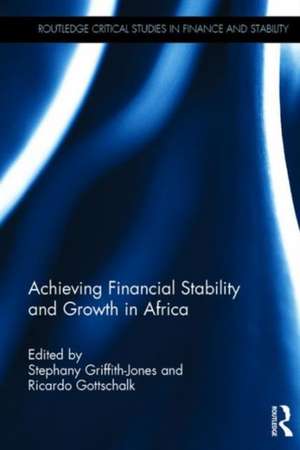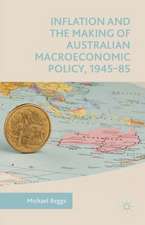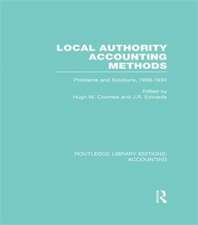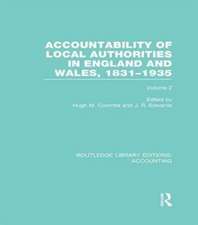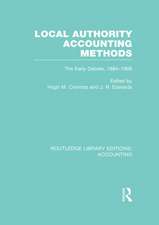Achieving Financial Stability and Growth in Africa: Routledge Critical Studies in Finance and Stability
Editat de Stephany Griffith-Jones, Ricardo Gottschalken Limba Engleză Hardback – 24 mar 2016
Achieving Financial Stability and Growth in Africa has major academic and policy implications, especially for low income countries, but also more generally, on broader issues. These include the desirable size of the financial sector, as well as more specific issues, such as the high cost of borrowing of small and medium enterprises in LICs, and possible measures to reduce it. Highly topical subjects like the appropriate regulation of the financial sector and management of capital flows are discussed in depth. Though drawing on comprehensive reviews of the literature, this volume has the virtue of the large comparative academic and policy experience of researchers, as well as in-depth case studies, that take account of institutional and economic features of low- income countries.
Written by senior academics and policy-makers, this book is a must read for those researching or participating in the financial sectors of low-income countries, as well as in developed economies. It is also suitable for those who study political economy and public finance.
| Toate formatele și edițiile | Preț | Express |
|---|---|---|
| Paperback (1) | 172.64 lei 6-8 săpt. | |
| Taylor & Francis – 12 dec 2019 | 172.64 lei 6-8 săpt. | |
| Hardback (1) | 569.37 lei 6-8 săpt. | |
| Taylor & Francis – 24 mar 2016 | 569.37 lei 6-8 săpt. |
Din seria Routledge Critical Studies in Finance and Stability
-
 Preț: 288.26 lei
Preț: 288.26 lei -
 Preț: 292.83 lei
Preț: 292.83 lei - 28%
 Preț: 852.88 lei
Preț: 852.88 lei -
 Preț: 489.26 lei
Preț: 489.26 lei -
 Preț: 349.38 lei
Preț: 349.38 lei -
 Preț: 349.53 lei
Preț: 349.53 lei - 17%
 Preț: 172.64 lei
Preț: 172.64 lei - 12%
 Preț: 312.43 lei
Preț: 312.43 lei - 16%
 Preț: 299.52 lei
Preț: 299.52 lei - 17%
 Preț: 172.64 lei
Preț: 172.64 lei - 18%
 Preț: 1001.84 lei
Preț: 1001.84 lei -
 Preț: 381.98 lei
Preț: 381.98 lei - 19%
 Preț: 269.76 lei
Preț: 269.76 lei -
 Preț: 413.33 lei
Preț: 413.33 lei - 20%
 Preț: 264.13 lei
Preț: 264.13 lei -
 Preț: 382.32 lei
Preț: 382.32 lei - 18%
 Preț: 274.06 lei
Preț: 274.06 lei - 22%
 Preț: 324.29 lei
Preț: 324.29 lei -
 Preț: 389.38 lei
Preț: 389.38 lei - 15%
 Preț: 322.60 lei
Preț: 322.60 lei - 14%
 Preț: 325.70 lei
Preț: 325.70 lei - 16%
 Preț: 225.30 lei
Preț: 225.30 lei - 18%
 Preț: 1005.39 lei
Preț: 1005.39 lei
Preț: 569.37 lei
Preț vechi: 1102.79 lei
-48% Nou
Puncte Express: 854
Preț estimativ în valută:
108.96€ • 113.34$ • 89.95£
108.96€ • 113.34$ • 89.95£
Carte tipărită la comandă
Livrare economică 15-29 aprilie
Preluare comenzi: 021 569.72.76
Specificații
ISBN-13: 9781138123731
ISBN-10: 1138123730
Pagini: 202
Ilustrații: 58
Dimensiuni: 156 x 234 x 15 mm
Greutate: 0.45 kg
Ediția:1
Editura: Taylor & Francis
Colecția Routledge
Seria Routledge Critical Studies in Finance and Stability
Locul publicării:Oxford, United Kingdom
ISBN-10: 1138123730
Pagini: 202
Ilustrații: 58
Dimensiuni: 156 x 234 x 15 mm
Greutate: 0.45 kg
Ediția:1
Editura: Taylor & Francis
Colecția Routledge
Seria Routledge Critical Studies in Finance and Stability
Locul publicării:Oxford, United Kingdom
Public țintă
Postgraduate and UndergraduateCuprins
Introduction 1. A financial sector to support development in low income countries Stephany Griffith-Jones with Ewa Karwowski and Florence Dafe 2. Financial regulation, stability and growth in low-income countries: a review of the evidence and agenda for research Stephen Spratt 3. Literature survey on capital account management in low-income countries Isabella Massa 4. Assessing Capacity Constraints for Effective Financial Regulation in SSA Ricardo Gottschalk 5. Financial Regulation in Kenya: Balancing Inclusive Growth with Financial Stability Francis M. Mwega 6. Financial regulation in Ghana: balancing inclusive growth with financial stability Charles Ackah and Johnson P. Asiamah 7. Financial regulation in Lics: balancing inclusive growth with financial stability – the Nigerian case Olu Ajakaiye and Sheriffdeen Tella 8. Financial Inclusion, Regulation and Inclusive Growth in Ethiopia Getnet Alemu 9. Conclusions Stephany Griffith-Jones, Ricardo Gottschalk and Stephan Spratt
Recenzii
'Packs a lot in 186 pages, is essential reading for specialists, and an excellent source of reference that should be on every central bank library shelf." — John Chown, Central Banking Journal
‘Ahead of the 2008 crisis many economists assumed that financial deepening – including increased private credit as a percent of GDP – was always positive for economic growth. We now know that there can be too much finance and too much private credit. But good finance is still crucial to economic development, and low- income countries must use the lessons of the global financial crisis to help identify which forms of financial development are most beneficial. This book will play an important role in that debate, combining sound empirical analysis, informative case studies and thoughtful synthesis of the overall insights and implications.’ — Adair Turner, former chair of the UK Financial Services Authority and author of Between Debt and the Devil
‘This is a compelling factual study about a critical dilemma for policy making in LICs – delicately balancing the trinity of financial inclusion, financial stability and growth agendas. This is even more challenging in the face of globalisation, inadequacies within domestic jurisdictions, ongoing reforms to global regulatory architecture and new rules like Anti Money Laundering that pose unintended consequences.’ — Louis Kasekende PhD, Deputy Governor, Bank of Uganda
‘This book is very timely - we know that for many low income countries financial regulation is at a crossroads, as policy makers strive to find a promising way forward, after the global financial crisis (2007-8). Of course, some recent studies have tried to re-examine financial regulation post-2008. But this book is exceptional: it offers a nice twist, ‘financial regulation for stability and growth’; it is meticulously researched, under an ESRC-DFID funded project on bank regulation, led by Stephany Griffith-Jones and involving other leading scholars in the field, who have deep appreciation for policy and practice. Moreover, the book presents a uniquely rich body of findings from four case studies, on Ghana, Ethiopia, Nigeria and Kenya, written by country scholars (e.g. the case on Kenya by Francis Mwega is a prize winner). The case study findings will ring bells with researchers and resonate with policy advisers and policy makers at central banks in Africa. Overall, I strongly endorse this outstanding book, which will strike a chord with many African central bank governors, on the question of financial regulation for stability!’ — Professor Victor Murinde, University of Birmingham, UK
"This interesting book has both superb qualities and surprising omissions, discussing an important and highly topical subject. (…) [It] offers a comprehensive review of previous academic literature, and is based on a three-year international project. (…) [It] is essential reading for specialists and an excellent source of reference that should be on every central bank library shelf." – John Clown
‘Ahead of the 2008 crisis many economists assumed that financial deepening – including increased private credit as a percent of GDP – was always positive for economic growth. We now know that there can be too much finance and too much private credit. But good finance is still crucial to economic development, and low- income countries must use the lessons of the global financial crisis to help identify which forms of financial development are most beneficial. This book will play an important role in that debate, combining sound empirical analysis, informative case studies and thoughtful synthesis of the overall insights and implications.’ — Adair Turner, former chair of the UK Financial Services Authority and author of Between Debt and the Devil
‘This is a compelling factual study about a critical dilemma for policy making in LICs – delicately balancing the trinity of financial inclusion, financial stability and growth agendas. This is even more challenging in the face of globalisation, inadequacies within domestic jurisdictions, ongoing reforms to global regulatory architecture and new rules like Anti Money Laundering that pose unintended consequences.’ — Louis Kasekende PhD, Deputy Governor, Bank of Uganda
‘This book is very timely - we know that for many low income countries financial regulation is at a crossroads, as policy makers strive to find a promising way forward, after the global financial crisis (2007-8). Of course, some recent studies have tried to re-examine financial regulation post-2008. But this book is exceptional: it offers a nice twist, ‘financial regulation for stability and growth’; it is meticulously researched, under an ESRC-DFID funded project on bank regulation, led by Stephany Griffith-Jones and involving other leading scholars in the field, who have deep appreciation for policy and practice. Moreover, the book presents a uniquely rich body of findings from four case studies, on Ghana, Ethiopia, Nigeria and Kenya, written by country scholars (e.g. the case on Kenya by Francis Mwega is a prize winner). The case study findings will ring bells with researchers and resonate with policy advisers and policy makers at central banks in Africa. Overall, I strongly endorse this outstanding book, which will strike a chord with many African central bank governors, on the question of financial regulation for stability!’ — Professor Victor Murinde, University of Birmingham, UK
"This interesting book has both superb qualities and surprising omissions, discussing an important and highly topical subject. (…) [It] offers a comprehensive review of previous academic literature, and is based on a three-year international project. (…) [It] is essential reading for specialists and an excellent source of reference that should be on every central bank library shelf." – John Clown
Descriere
This book explores how the financial system should be regulated and structured to achieve the twin goals of inclusive growth and financial stability, with a focus on African low-income countries (LICs). The subject and content of this book is original in that it attempts to draw on the lessons and radical rethinking on the financial sector in developed and middle income countries, arising in the wake of the international financial crisis. It includes four in- depth country case studies, of Kenya, Ghana, Nigeria and Ethiopia, but also analyses the empirical evidence for Sub-Saharan Africa as a whole.
Notă biografică
Stephany Griffith-Jones is Associate Fellow at ODI, Financial Markets Director at IPD, Columbia University and Emeritus at IDS, Sussex, where she was Professorial Fellow for a long time.
Ricardo Gottschalk is an Economic Affairs Officer at the Division of Globalization and Development Strategies (GDS) of UNCTAD, Geneva, Switzerland.
Ricardo Gottschalk is an Economic Affairs Officer at the Division of Globalization and Development Strategies (GDS) of UNCTAD, Geneva, Switzerland.
